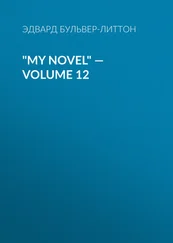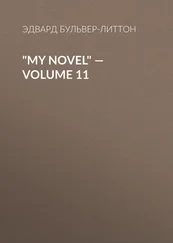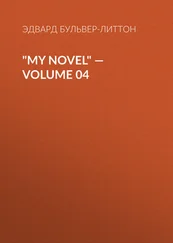Эдвард Бульвер-Литтон - My Novel — Complete
Здесь есть возможность читать онлайн «Эдвард Бульвер-Литтон - My Novel — Complete» — ознакомительный отрывок электронной книги совершенно бесплатно, а после прочтения отрывка купить полную версию. В некоторых случаях можно слушать аудио, скачать через торрент в формате fb2 и присутствует краткое содержание. Жанр: foreign_prose, literature_19, Европейская старинная литература, foreign_antique, на английском языке. Описание произведения, (предисловие) а так же отзывы посетителей доступны на портале библиотеки ЛибКат.
- Название:My Novel — Complete
- Автор:
- Жанр:
- Год:неизвестен
- ISBN:нет данных
- Рейтинг книги:5 / 5. Голосов: 1
-
Избранное:Добавить в избранное
- Отзывы:
-
Ваша оценка:
- 100
- 1
- 2
- 3
- 4
- 5
My Novel — Complete: краткое содержание, описание и аннотация
Предлагаем к чтению аннотацию, описание, краткое содержание или предисловие (зависит от того, что написал сам автор книги «My Novel — Complete»). Если вы не нашли необходимую информацию о книге — напишите в комментариях, мы постараемся отыскать её.
My Novel — Complete — читать онлайн ознакомительный отрывок
Ниже представлен текст книги, разбитый по страницам. Система сохранения места последней прочитанной страницы, позволяет с удобством читать онлайн бесплатно книгу «My Novel — Complete», без необходимости каждый раз заново искать на чём Вы остановились. Поставьте закладку, и сможете в любой момент перейти на страницу, на которой закончили чтение.
Интервал:
Закладка:
“All this is as old as the hills,” quoth Riccabocca, irreverently; “but the hills stand still, and this—there it goes!” and the sage pointed to a cloud emitted from his pipe. “Did you ever read Sir David Brewster on Optical Delusions? No! Well, I’ll lend it to you. You will find therein a story of a lady who always saw a black cat on her hearth-rug. The black cat existed only in her fancy, but the hallucination was natural and reasonable,—eh, what do you think?”
“Why, sir,” said Leonard, not catching the Italian’s meaning, “I don’t exactly see that it was natural and reasonable.”
“Foolish boy, yes! because black cats are things possible and known. But who ever saw upon earth a community of men such as sit on the hearth-rugs of Messrs. Owen and Fourier? If the lady’s hallucination was not reasonable, what is his who believes in such visions as these?”
Leonard bit his lip.
“My dear boy,” cried Riccabocca, kindly, “the only thing sure and tangible to which these writers would lead you lies at the first step, and that is what is commonly called a Revolution. Now, I know what that is. I have gone, not indeed through a revolution, but an attempt at one.”
Leonard raised his eyes towards his master with a look of profound respect and great curiosity.
“Yes,” added Riccabocca, and the face on which the boy gazed exchanged its usual grotesque and sardonic expression for one animated, noble, and heroic. “Yes, not a revolution for chimeras, but for that cause which the coldest allow to be good, and which, when successful, all time approves as divine,—the redemption of our native soil from the rule of the foreigner! I have shared in such an attempt. And,” continued the Italian, mournfully, “recalling now all the evil passions it arouses, all the ties it dissolves, all the blood that it commands to flow, all the healthful industry it arrests, all the madmen that it arms, all the victims that it dupes, I question whether one man really honest, pure, and humane, who has once gone through such an ordeal, would ever hazard it again, unless he was assured that the victory was certain,—ay, and the object for which he fights not to be wrested from his hands amidst the uproar of the elements that the battle has released.”
The Italian paused, shaded his brow with his hand, and remained long silent. Then, gradually resuming his ordinary tone, he continued,—
“Revolutions that have no definite objects made clear by the positive experience of history; revolutions, in a word, that aim less at substituting one law or one dynasty for another, than at changing the whole scheme of society, have been little attempted by real statesmen. Even Lycurgus is proved to be a myth who never existed. Such organic changes are but in the day-dreams of philosophers who lived apart from the actual world, and whose opinions (though generally they were very benevolent, good sort of men, and wrote in an elegant poetical style) one would no more take on a plain matter of life, than one would look upon Virgil’s Eclogues as a faithful picture of the ordinary pains and pleasures of the peasants who tend our sheep. Read them as you would read poets, and they are delightful. But attempt to shape the world according to the poetry, and fit yourself for a madhouse. The farther off the age is from the realization of such projects, the more these poor philosophers have indulged them. Thus, it was amidst the saddest corruption of court manners that it became the fashion in Paris to sit for one’s picture with a crook in one’s hand, as Alexis or Daphne. Just as liberty was fast dying out of Greece, and the successors of Alexander were founding their monarchies, and Rome was growing up to crush in its iron grasp all States save its own, Plato withdraws his eyes from the world, to open them in his dreamy “Atlantis.” Just in the grimmest period of English history, with the axe hanging over his head, Sir Thomas More gives you his “Utopia.” Just when the world is to be the theatre of a new Sesostris, the sages of France tell you that the age is too enlightened for war, that man is henceforth to be governed by pure reason, and live in a paradise. Very pretty reading all this to a man like me, Lenny, who can admire and smile at it. But to you, to the man who has to work for his living, to the man who thinks it would be so much more pleasant to live at his ease in a phalanstere than to work eight or ten hours a day; to the man of talent and action and industry, whose future is invested in that tranquillity and order of a State in which talent and action and industry are a certain capital,—why, Messrs. Coutts, the great bankers, had better encourage a theory to upset the system of banking! Whatever disturbs society, yea, even by a causeless panic, much more by an actual struggle, falls first upon the market of labour, and thence affects prejudicially every department of intelligence. In such times the arts are arrested; literature is neglected; people are too busy to read anything save appeals to their passions. And capital, shaken in its sense of security, no longer ventures boldly through the land, calling forth all the energies of toil and enterprise, and extending to every workman his reward. Now, Lenny, take this piece of advice. You are young, clever, and aspiring: men rarely succeed in changing the world; but a man seldom fails of success if he lets the world alone, and resolves to make the best of it. You are in the midst of the great crisis of your life; it is the struggle between the new desires knowledge excites, and that sense of poverty which those desires convert either into hope and emulation, or into envy and despair. I grant that it is an up-hill work that lies before you; but don’t you think it is always easier to climb a mountain than it is to level it? These books call on you to level the mountain; and that mountain is the property of other people, subdivided amongst a great many proprietors, and protected by law. At the first stroke of the pickaxe, it is ten to one but what you are taken up for a trespass. But the path up the mountain is a right of way uncontested. You may be safe at the summit, before (even if the owners are fools enough to let you) you could have levelled a yard. Cospetto!” quoth the doctor, “it is more than two thousand years ago since poor Plato began to level it, and the mountain is as high as ever!”
Thus saying, Riccabocca came to the end of his pipe, and stalking thoughtfully away, he left Leonard Fairfield trying to extract light from the smoke.
CHAPTER IX
Shortly after this discourse of Riccabocca’s, an incident occurred to Leonard that served to carry his mind into new directions. One evening, when his mother was out, he was at work on a new mechanical contrivance, and had the misfortune to break one of the instruments which he employed. Now it will be remembered that his father had been the squire’s head carpenter: the widow had carefully hoarded the tools of his craft, which had belonged to her poor Mark; and though she occasionally lent them to Leonard, she would not give them up to his service. Amongst these Leonard knew that he should find the one that he wanted; and being much interested in his contrivance, he could not wait till his mother’s return. The tools, with other little relies of the lost, were kept in a large trunk in Mrs. Fairfield’s sleepingroom; the trunk was not locked, and Leonard went to it with out ceremony or scruple. In rummaging for the instrument his eye fell upon a bundle of manuscripts; and he suddenly recollected that when he was a mere child, and before he much knew the difference between verse and prose, his mother had pointed to these manuscripts, and said, “One day or other, when you can read nicely, I’ll let you look at these, Lenny. My poor Mark wrote such verses—ah, he was a schollard!” Leonard, reasonably enough, thought that the time had now arrived when he was worthy the privilege of reading the paternal effusions, and he took forth the manuscripts with a keen but melancholy interest. He recognized his father’s handwriting, which he had often seen before in account-books and memoranda, and read eagerly some trifling poems, which did not show much genius, nor much mastery of language and rhythm,—such poems, in short, as a self-educated man, with poetic taste and feeling rather than poetic inspiration or artistic culture, might compose with credit, but not for fame. But suddenly, as he turned over these “Occasional Pieces,” Leonard came to others in a different handwriting,—a woman’s handwriting, small and fine and exquisitely formed. He had scarcely read six lines of these last, before his attention was irresistibly chained. They were of a different order of merit from poor Mark’s; they bore the unmistakable stamp of genius. Like the poetry of women in general, they were devoted to personal feeling,—they were not the mirror of a world, but reflections of a solitary heart. Yet this is the kind of poetry most pleasing to the young. And the verses in question had another attraction for Leonard: they seemed to express some struggle akin to his own,—some complaint against the actual condition of the writer’s life, some sweet melodious murmurs at fortune. For the rest, they were characterized by a vein of sentiment so elevated, that, if written by a man, it would have run into exaggeration; written by a woman, the romance was carried off by so many genuine revelations of sincere, deep, pathetic feeling, that it was always natural, though true to a nature for which you would not augur happiness.
Читать дальшеИнтервал:
Закладка:
Похожие книги на «My Novel — Complete»
Представляем Вашему вниманию похожие книги на «My Novel — Complete» списком для выбора. Мы отобрали схожую по названию и смыслу литературу в надежде предоставить читателям больше вариантов отыскать новые, интересные, ещё непрочитанные произведения.
Обсуждение, отзывы о книге «My Novel — Complete» и просто собственные мнения читателей. Оставьте ваши комментарии, напишите, что Вы думаете о произведении, его смысле или главных героях. Укажите что конкретно понравилось, а что нет, и почему Вы так считаете.












